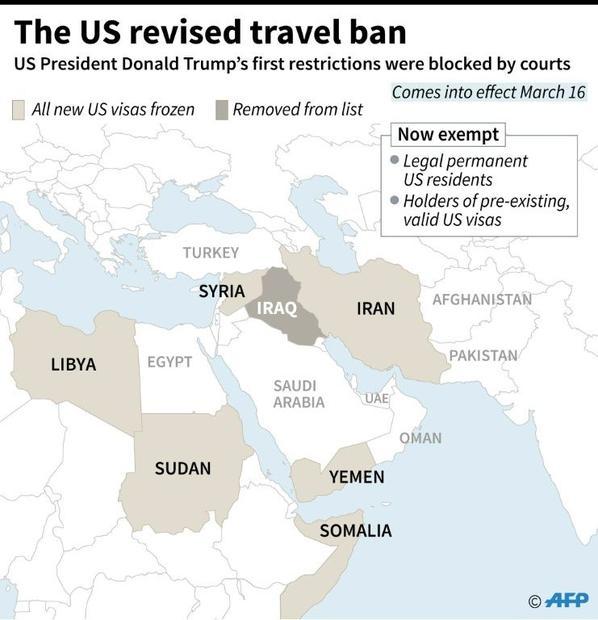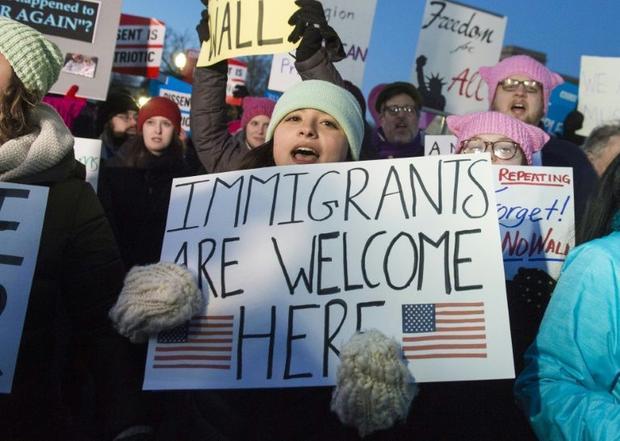President Donald Trump's revised travel ban faced a trio of legal challenges in federal court Wednesday before judges who could conceivably halt the order a day before it is due to take effect.
A 90-minute hearing was held in Greenbelt, Maryland near Washington and Judge Theodore Chuang said afterward he hoped to announce a decision later Wednesday.
Another federal court hearing on the travel ban targeting all refugees and people from six mainly Muslim countries was underway in Hawaii, officials said, while a third was due to start in Washington state later Wednesday.
The judge in Hawaii said he will issue a decision before the new travel ban takes effect at 6 pm local time (0400 GMT), media reports said, while the judge in Washington state could also make a decision later in the day.
Chuang heard a complaint filed by a coalition of advocacy groups that included the American Civil Liberties Union, the most powerful US human rights organization. They argued that Trump's amended order, like his first one, discriminates against Muslims.
"In his mind, the danger of Muslims and the danger of refugees is all combined danger," Omar Jadwat, a lawyer for the ACLU, said of the president.
Justin Cox, another attorney for coalition of plaintiffs, said "We are very hopeful that by 12:01 tomorrow, when this executive order is supposed to be in effect, we will have an injunction blocking it for the reasons we have argued."
Under the US legal system, a federal judge can suspend all or part of the Trump executive order, with nationwide effect.
"Our claim is the executive order in purpose and effect is intended to discriminate against Muslims and it condemns their religion," Cox added.
- No 'religious distinction' -
The first version of Trump's order triggered protests at home and abroad as well as chaos at US airports as people were detained upon arrival and either held for hours or sent back to where they came from.
The Trump administration narrowed the restrictions in its revised order to try to ensure it will be unassailable this time around -- after the initial ban was put on hold by the federal courts.
"This order doesn't draw any religious distinction at all," said Jeffrey Wall, a government attorney.
Questioned about tweets that Trump sent and statements he made during the presidential campaign in which he promised to enact a "Muslim ban," Wall said: "There is a difference between a president and a candidate."
Several states along with refugee assistance programs and rights groups have brought suits over the Republican leader's revamped version of the order he issued on January 27.
A group of 58 companies, including Lyft, Airbnb and Dropbox, submitted documents backing the Hawaii lawsuit, saying it would "inflict significant and irreparable harm on US businesses and their employees."
Trump's new measure aims to bar all refugees from entering the US for 120 days and halts the granting of new visas for travelers from six mostly-Muslim nations: Iran, Libya, Somalia, Sudan, Syria and Yemen for 90 days.
Iraq was dropped from the list in the second order, which also explicitly exempts legal permanent residents and valid visa holders.
Trump's administration says the travel ban is necessary to keep extremists from entering the United States.
But critics say the new order essentially remains a ban on Muslims coming to the United States, and therefore unconstitutional because it singles out people of a certain religion for discrimination.
- Coast to coast -
Since September 11, 2001, the worst attacks in the United States have been committed either by radicalized Americans or by people from countries not on the Trump travel ban list.
Critics also argue that it will have a very negative effect on schools and universities and the business world, mainly the high tech sector, which employs many highly skilled immigrants.
The new battle against Trump's order is being played out on several geographical fronts, but mainly on the west coast, which tends to be pro-Democrat.
The state of Washington, joined by five other states, filed a complaint Monday with the same Seattle judge who stayed Trump's original travel ban in February.
Trump responded by insulting that federal magistrate, James Robart, calling him a "so-called judge."
It is Robart who will oversee the Washington state hearing on Wednesday and he could once again suspend all or part of the new order.
Hawaii has also filed its own, separate request for an injunction. The far flung Pacific state is home to many people of non-US origin.
The US government filed an opposing motion in Hawaii, saying the travel ban is "a valid exercise of the president's broad statutory authority to 'suspend the entry of any aliens or of any class of aliens.'"
President Donald Trump’s revised travel ban faced a trio of legal challenges in federal court Wednesday before judges who could conceivably halt the order a day before it is due to take effect.
A 90-minute hearing was held in Greenbelt, Maryland near Washington and Judge Theodore Chuang said afterward he hoped to announce a decision later Wednesday.
Another federal court hearing on the travel ban targeting all refugees and people from six mainly Muslim countries was underway in Hawaii, officials said, while a third was due to start in Washington state later Wednesday.
The judge in Hawaii said he will issue a decision before the new travel ban takes effect at 6 pm local time (0400 GMT), media reports said, while the judge in Washington state could also make a decision later in the day.
Chuang heard a complaint filed by a coalition of advocacy groups that included the American Civil Liberties Union, the most powerful US human rights organization. They argued that Trump’s amended order, like his first one, discriminates against Muslims.
“In his mind, the danger of Muslims and the danger of refugees is all combined danger,” Omar Jadwat, a lawyer for the ACLU, said of the president.
Justin Cox, another attorney for coalition of plaintiffs, said “We are very hopeful that by 12:01 tomorrow, when this executive order is supposed to be in effect, we will have an injunction blocking it for the reasons we have argued.”
Under the US legal system, a federal judge can suspend all or part of the Trump executive order, with nationwide effect.
“Our claim is the executive order in purpose and effect is intended to discriminate against Muslims and it condemns their religion,” Cox added.
– No ‘religious distinction’ –
The first version of Trump’s order triggered protests at home and abroad as well as chaos at US airports as people were detained upon arrival and either held for hours or sent back to where they came from.
The Trump administration narrowed the restrictions in its revised order to try to ensure it will be unassailable this time around — after the initial ban was put on hold by the federal courts.
“This order doesn’t draw any religious distinction at all,” said Jeffrey Wall, a government attorney.
Questioned about tweets that Trump sent and statements he made during the presidential campaign in which he promised to enact a “Muslim ban,” Wall said: “There is a difference between a president and a candidate.”
Several states along with refugee assistance programs and rights groups have brought suits over the Republican leader’s revamped version of the order he issued on January 27.
A group of 58 companies, including Lyft, Airbnb and Dropbox, submitted documents backing the Hawaii lawsuit, saying it would “inflict significant and irreparable harm on US businesses and their employees.”
Trump’s new measure aims to bar all refugees from entering the US for 120 days and halts the granting of new visas for travelers from six mostly-Muslim nations: Iran, Libya, Somalia, Sudan, Syria and Yemen for 90 days.
Iraq was dropped from the list in the second order, which also explicitly exempts legal permanent residents and valid visa holders.
Trump’s administration says the travel ban is necessary to keep extremists from entering the United States.
But critics say the new order essentially remains a ban on Muslims coming to the United States, and therefore unconstitutional because it singles out people of a certain religion for discrimination.
– Coast to coast –
Since September 11, 2001, the worst attacks in the United States have been committed either by radicalized Americans or by people from countries not on the Trump travel ban list.
Critics also argue that it will have a very negative effect on schools and universities and the business world, mainly the high tech sector, which employs many highly skilled immigrants.
The new battle against Trump’s order is being played out on several geographical fronts, but mainly on the west coast, which tends to be pro-Democrat.
The state of Washington, joined by five other states, filed a complaint Monday with the same Seattle judge who stayed Trump’s original travel ban in February.
Trump responded by insulting that federal magistrate, James Robart, calling him a “so-called judge.”
It is Robart who will oversee the Washington state hearing on Wednesday and he could once again suspend all or part of the new order.
Hawaii has also filed its own, separate request for an injunction. The far flung Pacific state is home to many people of non-US origin.
The US government filed an opposing motion in Hawaii, saying the travel ban is “a valid exercise of the president’s broad statutory authority to ‘suspend the entry of any aliens or of any class of aliens.'”
















